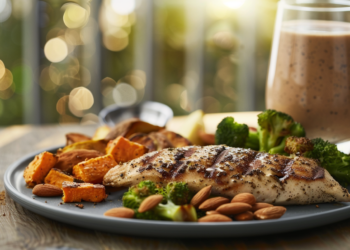Proper pre-workout meal timing is vital for peak performance, muscle recovery, and providing essential fuel for focus and athletic success. It ensures nutrients are available when needed most, impacting both endurance and strength positively. Hydration sustains energy, carbs fuel muscles, and balanced nutrition boosts stamina. Consider the meal's composition, as it affects nutrient absorption crucial for muscle repair and growth. Adequate protein intake prevents breakdown, while healthy fats aid in injury prevention. Tailor timing to workout intensity for optimal results. This understanding can greatly elevate your fitness outcomes.
Key Takeaways
- Enhances performance and muscle recovery.
- Provides necessary fuel for energy.
- Improves focus and overall athletic performance.
- Optimizes nutrient utilization and absorption.
- Ensures sustained energy levels and endurance.
Benefits of Timed Pre-Workout Nutrition
Incorporating a well-timed pre-workout meal can significantly enhance performance and optimize muscle recovery. Consuming the right nutrients before exercise provides our bodies with the necessary fuel to perform at our best. Improved focus is one of the key benefits of having a pre-workout meal. When we fuel our bodies adequately before a workout, we're better able to concentrate on the task at hand, leading to a more productive training session.
Furthermore, a properly timed pre-workout meal can lead to enhanced performance. Carbohydrates are essential for fueling our muscles during exercise, and having them before a workout can improve endurance and strength. Proteins consumed pre-workout also play a crucial role in muscle repair and growth, enhancing overall performance. By ensuring we've the right balance of nutrients before exercising, we set ourselves up for success and are more likely to achieve our fitness goals.
Impact on Workout Performance
To optimize workout performance, proper timing of pre-workout meals is crucial for providing the necessary nutrients for fueling muscles and enhancing endurance. Consuming the right foods at the right time can significantly impact athletic performance by ensuring your body has the energy it needs to push through intense workouts. Here are some key timing strategies for optimally fueling your body before a workout:
| Timing Strategy | Description |
|---|---|
| 1-2 Hours Before | Consume a balanced meal rich in carbohydrates, proteins, and fats to provide sustained energy. |
| 30 Minutes Before | Have a small snack containing easily digestible carbohydrates and a moderate amount of protein. |
| 10-15 Minutes Before | Opt for a light snack or a sports drink to quickly boost energy levels without causing discomfort. |
These strategies can help enhance performance during workouts by ensuring your body has the necessary nutrients available when you need them most. By fueling your muscles adequately before exercise, you can improve endurance, strength, and overall athletic performance.
Energy Levels and Endurance

Maintaining optimal energy levels and endurance during a workout requires strategic fueling of the body with essential nutrients at the right times. To maximize stamina and sustain power throughout your exercise session, consider the following:
- Hydration: Drinking an adequate amount of water before and during exercise is crucial for sustaining energy levels and enhancing endurance. Dehydration can lead to decreased performance and fatigue, so ensure you're well-hydrated before starting your workout.
- Carbohydrate Intake: Consuming carbohydrates before a workout provides the necessary fuel for your muscles. Opt for complex carbohydrates like whole grains, fruits, and vegetables to sustain power output and delay fatigue during your training session.
- Balanced Nutrition: A well-rounded pre-workout meal that includes a mix of carbohydrates, proteins, and fats can help maintain steady energy levels and support endurance. Balancing your nutrients ensures a sustained release of energy throughout your workout, enabling you to perform at your best.
Nutrient Utilization and Absorption
Understanding how nutrients are utilized and absorbed by the body is essential for optimizing performance and maximizing the benefits of your pre-workout meal. Meal composition plays a crucial role in determining how efficiently the nutrients will be absorbed and utilized during exercise.
The digestion process is the first step in breaking down the macronutrients present in your meal, such as carbohydrates, proteins, and fats.
Carbohydrates are a primary energy source, and consuming them before a workout can provide readily available fuel for your muscles. Opt for easily digestible carbohydrates like fruits or whole grains to ensure a quick energy release.
Proteins, on the other hand, aid in muscle repair and growth. Including lean protein sources in your pre-workout meal can support muscle maintenance and recovery.
Fats are also important for sustained energy, especially during longer workouts. However, it's essential to choose healthy fats like those found in nuts or avocados to support overall health and performance.
Muscle Protein Synthesis

Muscle protein synthesis is a key process in muscle repair and growth, vital for enhancing athletic performance and recovery.
When it comes to protein timing for optimizing muscle protein synthesis, a few key points to consider include:
- Post-Exercise Window: Consuming protein-rich foods or supplements within the post-exercise window (typically within 30-60 minutes after a workout) is crucial for maximizing muscle protein synthesis. This is when muscles are most receptive to nutrients, promoting muscle repair and growth.
- Protein Quality: The quality of protein sources matters, with complete proteins containing all essential amino acids being ideal for muscle protein synthesis. Foods like lean meats, dairy, eggs, and plant-based sources like quinoa and soy are excellent options.
- Distribution Throughout the Day: While post-exercise protein intake is essential, spreading protein intake evenly throughout the day supports sustained muscle protein synthesis. Aim for regular protein consumption with meals and snacks to optimize muscle repair and growth.
Blood Sugar Regulation
Moving from the realm of muscle protein synthesis, we now shift our focus to the intricate process of regulating blood sugar levels within the body. Meal composition plays a crucial role in this process.
Meals rich in carbohydrates with a high glycemic index can cause a rapid spike in blood sugar levels, leading to a subsequent surge in insulin release. This rapid increase in blood sugar followed by a sharp decline can leave us feeling fatigued and lethargic during our workout.
On the other hand, meals with a lower glycemic index, which are slower to digest, provide a more sustained release of glucose into the bloodstream, promoting stable blood sugar levels and sustained energy during exercise.
Understanding how different foods impact our blood sugar levels and insulin response can help optimize our pre-workout meal choices for improved performance and energy levels. By selecting foods with a lower glycemic index and considering the digestion rate, we can support better blood sugar regulation and enhance our workout experience.
Metabolism and Fat Loss

When aiming to enhance metabolism and facilitate fat loss, it's essential to prioritize nutritional strategies that support sustainable energy levels and efficient calorie utilization. To achieve these goals effectively, one should consider the following key points:
- Hormone Regulation: Hormones play a crucial role in regulating metabolism and promoting weight loss. Consuming balanced meals at the right times can help optimize hormonal balance, enhancing the body's ability to burn fat efficiently.
- Meal Composition: The composition of your meals is vital for supporting fat loss. Including a balance of macronutrients such as protein, healthy fats, and complex carbohydrates can help maintain satiety, prevent energy crashes, and support metabolic functions.
- Muscle Preservation: During weight loss, it's important to preserve muscle mass as it contributes to overall metabolic rate. Adequate protein intake and resistance training can help prevent muscle loss, ensuring that the body primarily burns fat for energy.
Preventing Muscle Breakdown
To optimize physical performance and prevent muscle breakdown, it's crucial to focus on adequate nutrition and strategic meal timing. Adequate protein intake is essential to prevent muscle breakdown. Protein provides the necessary amino acids for muscle repair and growth, optimizing recovery post-exercise.
Additionally, consuming carbohydrates before a workout can help prevent muscle breakdown by providing a readily available energy source for the muscles to use during exercise. Ensuring proper hydration is also key in preventing injury and promoting muscle health. Dehydration can lead to decreased muscle function and increase the risk of muscle cramps and strains during exercise.
Incorporating healthy fats into your pre-workout meal can also be beneficial in preventing muscle breakdown. Omega-3 fatty acids, found in foods like salmon and chia seeds, have anti-inflammatory properties that can aid in muscle recovery and reduce the risk of injury.
Timing Based on Workout Intensity

Optimizing the timing of your pre-workout meal based on the intensity of your workout can significantly impact your physical performance and muscle recovery. Different intensity levels of exercise require varying timing strategies for optimal results. Here are some benefits of aligning your pre-workout meal timing with your workout intensity:
- High-Intensity Workouts: Consuming a balanced meal 2-3 hours before a high-intensity workout provides a sustainable energy source, enhancing endurance and maximizing performance.
- Moderate-Intensity Exercises: Eating a smaller snack containing carbohydrates and protein 30-60 minutes before a moderate-intensity workout can boost energy levels and prevent muscle breakdown during the session.
- Low-Intensity Activities: For light workouts, a small snack rich in carbohydrates 15-30 minutes beforehand can provide a quick energy source without causing digestive discomfort.
Maximizing Recovery and Growth
Aligning your pre-workout meal timing with your workout intensity not only impacts your physical performance but also plays a crucial role in maximizing recovery and growth. After a workout, the body's muscles are depleted of glycogen, and protein breakdown increases. This is where post-exercise nutrition becomes critical. Consuming a balanced meal or snack within the first 45 minutes to 2 hours post-workout can enhance muscle glycogen replenishment and decrease protein breakdown. Including a combination of carbohydrates and protein in this meal can jumpstart the recovery process and support muscle repair and growth.
In addition to post-exercise nutrition, incorporating effective recovery strategies is essential for maximizing the benefits of your workout. These strategies may include adequate hydration, stretching, foam rolling, and getting enough quality sleep. Hydration is key for maintaining optimal bodily functions, while stretching and foam rolling can help alleviate muscle soreness and improve flexibility. Quality sleep is when the body does most of its repair and recovery work, making it crucial for muscle growth and overall performance. By paying attention to both post-exercise nutrition and recovery strategies, you can optimize your body's ability to recover and grow stronger.
Frequently Asked Questions
Can Pre-Workout Meal Timing Have an Impact on Mental Focus and Concentration During a Workout?
Pre-workout meal timing impacts cognitive function and exercise performance. Nutrient timing influences mental acuity during workouts. Consuming the right foods at the right time can enhance mental focus, leading to improved concentration and overall workout effectiveness.
How Does the Timing of Pre-Workout Nutrition Affect Hydration Levels During Exercise?
When it comes to exercise, the timing of pre-workout nutrition plays a crucial role in maintaining electrolyte balance and supporting glycogen replenishment. This directly impacts hydration levels during physical activity, optimizing performance and endurance.
Are There Specific Types of Foods or Nutrients That Should Be Prioritized in a Pre-Workout Meal for Optimal Performance?
When planning a pre-workout meal for optimal performance, it's crucial to prioritize protein sources for muscle repair and carbohydrates for energy. Nutrient timing plays a key role in enhancing performance, so choose wisely.
Does the Timing of Pre-Workout Nutrition Differ for Individuals With Varying Fitness Goals, Such as Weight Loss Versus Muscle Gain?
When considering weight loss and endurance training, timing pre-workout nutrition strategically can enhance results. Meanwhile, individuals focused on muscle gain and strength training may benefit from adjusting their pre-workout meal timing to support their goals effectively.
Can Pre-Workout Meal Timing Influence Post-Workout Muscle Soreness and Recovery Time?
Pre-workout meal timing can impact post-workout muscle soreness and recovery time. Eating a balanced meal 1-2 hours before exercise can provide energy, reduce soreness, and enhance recovery benefits. Meal composition plays a crucial role in optimizing performance.
Conclusion
In conclusion, proper pre-workout meal timing is crucial for optimizing workout performance, energy levels, nutrient utilization, muscle protein synthesis, metabolism, fat loss, and preventing muscle breakdown.
By timing our meals based on workout intensity, we can maximize recovery and growth.
Remember, timing is key to fueling our bodies effectively and achieving our fitness goals.
So, let's fuel up, crush our workouts, and see the results we've been working towards!













